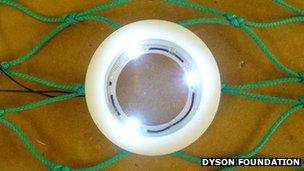SafetyNet emergency exits for fish win Dyson award
- Published

Getting the rings to harvest their own electricity proved to be one of the trickiest issues to solve
Fishing net "escape rings" that light up to help undersized creatures escape capture have been picked as this year's UK winner in a high-profile design engineering competition.
Dan Watson's project, external is designed to make fishing more sustainable.
The Glasgow School of Art graduate will now face finalists from 17 other countries for the international James Dyson Award.
He plans to launch the product regardless of the outcome.
SafetyNet is designed to help trawlers capture mature haddock and whiting, and prevent other kinds of smaller fish being thrown back into the sea dead because they are unmarketable
"The devices fit into trawl nets and they cut down on the bycatch of juvenile fish and also the wrong species of fish," Mr Watson told the BBC.
"The rings fit into the 'cod-end' of the net - the part where all the fish are kept - and they basically exploit fish behaviour and their physical size to guide some to safety while keeping the other ones in. They act as kind of emergency escape sign."
Rechargeable rings
The rings harvest their own energy from the nets' motion, meaning that once fitted the fishermen do not need to think about changing their batteries or switching them on and off.
The lights are activated once the net sinks to a certain depth, making the rings more visible and also stimulating the fish to swim towards them.
Because the devices are rigid they keep the surrounding net meshes open, preventing the gaps from closing when the equipment is under tension. Fish are often injured when this happens using standard equipment.
The devices are designed to be fitted to existing nets.
Mr Watson said that the average net would need about 20 of the rings costing a total of about £500 - but he added that over time they should pay for themselves.
"There are incentives attached to using sustainable fishing gear," he said
Mr Watson says fishermen should qualify for sustainability incentives if they fit the product
"For instance if it is used the authorities can grant fishermen extra days at sea which allows them to catch more fish. It can also be taken off one net and put onto a new one so it lasts a long time."
Mr Watson has won £1,000 for being picked as the UK champion.
A panel of three judges selected his entry over alternatives including a steam-enhanced scraper used to remove wallpaper; a double-walled mug that keeps liquids hot and fingers cool; and a "flash heater" designed to treat breast milk from HIV positive mothers to prevent them passing on the virus to their babies.
The international award includes £10,000 in cash for both the winner and their university department.
Whatever the outcome, Mr Watson said he planned to use the cash he had already won to further develop his prototypes before presenting them to marine management organisations which he hoped would help launch them as a commercial product.
BBC technology correspondent Rory Cellan-Jones was one of the judges.
- Published31 July 2012
- Published4 August 2010